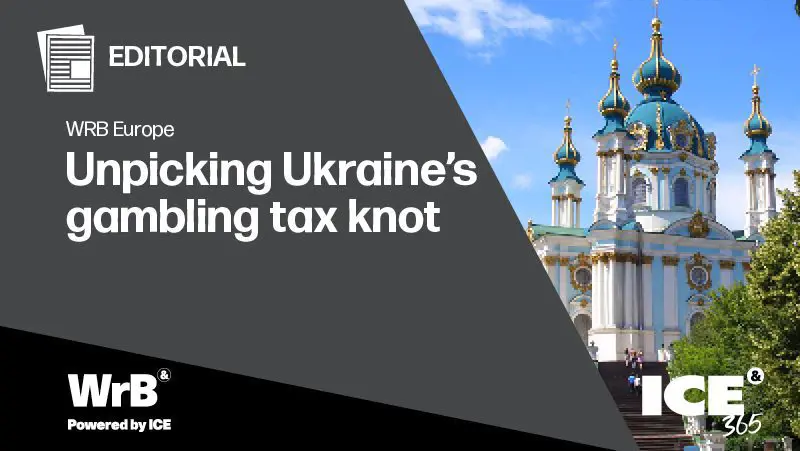Unpicking Ukraine’s gambling tax knot
Is Ukraine's tax law good enough to attract foreign competitors to Ukraine? Dmytro Hotsyn and Alina Plyushch of the gambling desk at Sayenko Kharenko examine the current structure and the new bill.

Despite re-legalising gambling a year ago, Ukraine is still missing the crucial tax changes that would make the local market attractive to a wider range of international brands.
A new draft tax frame for gambling businesses is in the legislative pipeline and is likely to become law soon.
The state of play
On the corporate side, gambling operators in Ukraine currently face a three-tiered taxation structure:
They face a gambling tax, on gross gaming revenue. Then they must pay a corporate income tax, as all businesses in the country do. And finally, they effectively pay players’ winnings tax.
In addition, if they wish to enter the market now, they face a tripled licence fee.
While corporate income tax applies to businesses at a universal rate of 18%, the GGR tax right now varies depending on the vertical in question. For example, betting companies are subject to 18% GGR tax and lottery operators’ GGR tax is 30%.
But what makes the taxes particularly burdensome it that, for all verticals, the GGR tax bills are not deductible for corporate income tax purposes.
On top, online casinos and betting operators’ licence fees are tripled until the launch of a dedicated state monitoring system (implementation deadline — August 2022). Slot machine halls operators’ fees for a slot machine are tripled as well. Land-based casinos and online poker sites are not affected by this rule.
Finally, gambling operators shall withhold 19.5% of each winning of their customers, acting as their tax agent for personal income tax purposes.
B2B providers are subject to standard corporate income tax rates at 18%, but the GGR-based gambling tax does not apply to them.
As a result, the current gambling tax environment would hardly please international investors seeking opportunities in a newly regulated market. Obvious inconsistencies in the gambling tax environment are the legacy of unsuccessful legalization attempts during the years between 2014 and 2016. During this time, some parts of the tax part of the gambling reform passed through the Parliament while the gambling law itself got stuck in political turmoil.
In 2020, the reverse occurred, with the law to legalise gambling passing while tax laws remain under consideration. As a result, gambling is currently taxed under the laws of a regime that never existed.
A possible solution
The updated version of draft tax law 2713-D resolves the crucial issues of the current tax framework.
The main changes are a unified 10% GGR tax for all gambling verticals and the deductibility of GGR tax expenses for corporate income tax purposes.
In addition, the discriminatory tripled licence fees will be removed, and sums that are already paid may be used to reduce future licence payments.
The law will also include a modification of personal winnings taxes. Winnings below UAH 47,000 - or around €1,500 - would not be taxed, while the excess sums will remain subject to the 19.5% tax.
When calculating the winnings tax base, land-based gambling operators may also deduct players' gambling losses made within the previous 24 hours. As a result, certain withdrawals will be effectively freed from taxation because of losses.
The draft law would also increase cash withdrawal limits for players in land-based casinos, allowing for payments of non-resident customers’ winnings - crucial as land-based casinos will be based in hotels with the aim of attracting tourists. Current limits are UAH47,000 per day.
Unresolved issues
However, the question of the personal winning taxes remains the most controversial one.
As Ukraine is seeking to promote its attractiveness among traveling players, the question of personal income tax (i.e. winning tax) is crucial for international land-based gambling brands wishing to make the entry into the Ukrainian market and to bring their clientele into Ukraine with them.
Facing a potential 19.5% winnings tax, their potential players may choose other destinations in the region (Batumi casinos - on Georgia’s Black Sea coast - look like the best alternative). It is argued that lowering or ideally, removing tax exposure of foreign players would bring a rise in revenues large enough for corporate taxes and the boost to the local economy to offset the costs of cutting the tax.
Lowering the winning tax rate would also emphasise local players (both online and land-based) to opt for locally licensed operators instead of grey or black-market competitors.
However, opposing voices cite increased money laundering issues connected with low-to-no taxation, with the opportunity to deposit and withdraw at low cost potentially making Ukraine’s casinos a more attractive money laundering destination.
As a middle ground, increasing tax-free allowances to between EUR 2,500-3,000 while removing taxation only for non-resident players - who would face checks when moving cash across borders - would address these concerns.
Ukraine’s parliament will have the final say on the issue.
In search of consensus
Public opinion remains extremely divided on the matter of gambling taxation despite the conspicuous irrationality of the current tax regime. That same division of views is present in the legislature as well. In June, an attempt to pass the bill in an expedited manner failed, despite receiving support from a majority of deputies.
It is dawning ultimately on the pro-bill MPs that such a sensitive issue may risk their political capital. However, increased tax revenues and licence fees may level the scales.
Thus, progress should be imminent. Once the bill becomes law, the Commission for the Regulation of Gambling and Lotteries (KRAIL) will see numerous new applications for gambling licences.